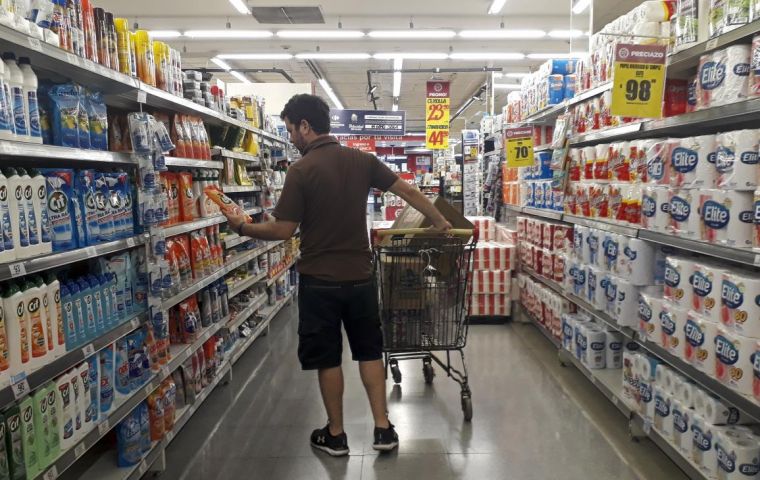MercoPress. South Atlantic News Agency
Argentina inflation in July was 1,9% and the 12-month rate 42,4%
 Food and non alcoholic beverage, which has the greatest percentage in the overall index, advanced 1,3% in July with specific higher prices for fruit, meats and fish
Food and non alcoholic beverage, which has the greatest percentage in the overall index, advanced 1,3% in July with specific higher prices for fruit, meats and fish Argentina's July inflation rate was 1.9%, the government's Indec statistics agency reported on Thursday, bringing the seven-month rate to 15,8% and the 12-month rate to 42.4%. During July the items which showed the main increase were Housing maintenance, 3,9% and Leisure and Culture, 3,3%, with a special emphasis in electronics and home appliances.
Food and non alcoholic beverage, which has the greatest percentage in the overall index, advanced 1,3% in July with specific higher prices for fruit, meats, fish and seafood, while at the other end the least influential resulted vegetables, tubers and legumes
Clothing and footwear which increased 3,3%, was quite heterogeneous among the different regions of Argentina with a greater push in Patagonia and Cuyo, while in the area known as metropolitan Buenos Aires because of the lockdown, these items reacted with extreme moderation.
Overall goods increased 2,3% and services, 1,1% since many of public service rates remain frozen. Likewise those products which are seasonal such as clothing fashion, certain food items, increased 0,9% during July, while the regulated prices which refer to many of the government services, 0,5%.
It must also be remembered that the official exchange rate of the Argentine currency against the dollar remains under strong control and there is a long list of over 1,000 goods which are identified as regulated prices and during July were allowed a minimum alteration.
What will happen when the gap between the official exchange rate for the US dollar and the black market, currently at 80% is adjusted to stabilize export costs, and public services rates also begin a gradual normalization process, has yet to be seen. Mainly because with a dramatic fall in revenue, the federal government has appealed to injecting liquidity, more than doubling peso emission to face all its social commitments and subsidies.




Top Comments
Disclaimer & comment rulesCommenting for this story is now closed.
If you have a Facebook account, become a fan and comment on our Facebook Page!